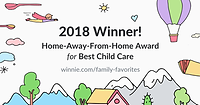

HOBOKEN
DAYCARE
100


OUR PROGRAMS
Utilizing the Creative Curriculum as well as other proven early childhood methodologies we teach your children through art, music and play making sure they reach important early learning standards.
INFANTS-Each day your child will be discovering things using all five senses, copying simple actions of the people around them, experimenting with toy instruments, exploring textures, colors, and learning a variety of words and sounds through playing with other children. Goals for infants focus on relationships with caregivers, developing trust and security, and exploration. Infants and toddlers should be given opportunities that utilize all their senses as they discover toys and other appropriate objects. Their interests should also be taken into account. Independent play, teacher-directed play, and increasing amounts of play with peers are all included in the curriculum. An appropriate curriculum recognizes the wide variety of development, interests, and temperaments present with young children. Throughout the daily routine, each activity from diapering to eating is seen as an opportunity for the caregiver to build a meaningful relationship with the child. A variety of learning experiences are provided as children play with objects, caregivers, and eventually their peers. The child's personality and interests are used to guide curriculum choices.
TODDLERS-When your child is all over the place, they're discovering their world! Toddlers learn best in safe, loving places where they can explore, in their own way. The activities for this age group are built around toddlers' limitless curiosity and their natural desire to push boundaries. During their time with us your child will learn to count, discover writing and music, and start building toward following simple instructions and using the potty.
Goals for toddlers focus on independence, discovery, need for control, and early social interactions. Infants and toddlers should be given opportunities that utilize all their senses as they discover toys and other appropriate objects. Their interests should also be taken into account. Independent play, teacher-directed play, and increasing amounts of play with peers are all included in the curriculum.
Throughout the daily routine, each activity from diapering to eating is seen as an opportunity for the caregiver to build a meaningful relationship with the child. A variety of learning experiences are provided as children play with objects, caregivers, and eventually their peers. The child's personality and interests are used to guide curriculum choices.
PRESCHOOL-With improved coordination and thinking the world begins to open up for preschoolers. Our program introduces language, math, science and social skills. Each day at Hoboken Day Care 100 preschoolers explore science experiments, create artwork, play dress up and play music and movement games. In this way they learn following directions and other key skills for learning success. Goals expand for preschool-age children to focus on exploration, investigation, and vocabulary growth. Knowledge in traditional subject areas like math, reading, science, social studies, and the arts is introduced. A challenging curriculum for preschoolers is sometimes child-led and other times teacher-led. Preschoolers have a wealth of interactions with caregivers, peers, and a wide variety of engaging materials. Also, students learn how to recognize their personal achievements.
PREK-Your child will gain independence while getting ready for the transition to kindergarten with a more organized environment. Each day your child will learn phonetic sounds, do simple addition and subtraction, creating simple patterns, sing songs, create art, and make music. The curriculum should be integrated overall with "focusing" lessons as needed. Focused lessons* are devoted to a particular skill like recognizing print numerals and letters. Educational materials reflect the children's culture. Individual, small group, and whole class activities are used to promote a child's learning. The teacher should use the interests of the students to help plan topics and lessons. Various academic subjects are taught through meaningful experiences and play is a cornerstone of the day.
-
Language
-
Literacy
-
Math
-
Science
-
Social Studies
-
Arts and crafts
-
Music and movement
-
Foreign languages (Spanish)
-
Social interaction




Give us a call:
201-792-4666
What Children Learn
On the basis of scientific research and state and professional standards, The Creative Curriculum identifies the knowledge, skills, and concepts important for preschool children to acquire in each content area: literacy, math, science, social studies, the arts, and technology.
We describe the key components of these content areas:
-
Literacy: vocabulary and language, phonological awareness, letters, words, print, comprehension, books and other texts, and sources of enjoyment
-
Mathematics: numbers; patterns and relationships; geometry and spatial awareness; measurement; and data collection, organization, and representation
-
Science: physical science, life science, and earth and the environment
-
Social Studies: spaces and geography, people and how they live, people and the environment, and people and the past
-
The Arts: dance, music, drama, and the visual arts
